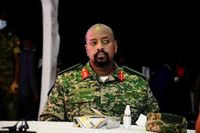In a shocking revelation, Uganda’s military chief, General Muhoozi Kainerugaba, has claimed that he is holding opposition leader Bobi Wine’s bodyguard, Eddie Mutwe, in his basement and torturing him. This alarming announcement came on May 1, 2025, via a series of posts on X, the platform formerly known as Twitter, where Kainerugaba mocked Wine’s concerns regarding Mutwe’s abduction. This claim has intensified the already mounting international criticism of the Ugandan government over its treatment of opposition figures.
The incident involving Mutwe, who is a prominent aide to Wine, occurred on April 27, 2025, when the National Unity Platform (NUP), the political party led by Wine, reported that armed men wearing uniforms linked to Uganda’s Special Forces Command had “violently abducted” him. Following the abduction, Kainerugaba’s posts escalated tensions further, as he boasted of having beaten Mutwe, shaved his head, and even threatened to “castrate him” if opposition figures continued to provoke the military.
Wine, who has emerged as the most significant challenger to President Yoweri Museveni’s 40-year rule, condemned the abduction and Kainerugaba’s statements, describing them as a stark reminder of the breakdown of law and order in Uganda. “For Muhoozi to confirm the abduction and illegal detention of Eddie Mutwe… signals to the level of impunity the rogue regime has reached,” he stated in an interview with AFP. The confirmation of Mutwe’s illegal detention, along with the sharing of half-naked photos of him, has drawn widespread condemnation from human rights organizations and the international community.
As the country gears up for its presidential election in January 2026, concerns about political violence are growing. The 2021 election, in which Museveni was re-elected, was marred by widespread violence and allegations of electoral fraud. The U.S.-based Holocaust Memorial Museum has even warned of the potential for “mass atrocities” surrounding the upcoming election.
Kainerugaba, who is not only the head of the army but also the son and heir-apparent to President Museveni, is notorious for his controversial social media posts. His inflammatory comments have previously led to diplomatic tensions, including a notable incident in 2022 when he threatened an invasion of neighboring Kenya, prompting an apology from President Museveni. In January 2025, he announced he was quitting X after a series of controversial posts but later returned to the platform.
The Ugandan military’s actions and Kainerugaba’s statements reflect a broader pattern of repression against dissenting voices in the country. The abduction of Kizza Besigye, a veteran opposition leader who was seized in Kenya last year and forcibly returned to Uganda to face treason charges, exemplifies the lengths to which the government will go to silence opposition. Such incidents have raised alarms among rights advocates who fear that the upcoming election could be marked by increased violence and repression.
The implications of Kainerugaba’s claims are profound, as they highlight the deteriorating state of human rights in Uganda and the increasing boldness of the military in targeting opposition figures. With the election looming, the stakes are high, and the international community is closely monitoring the situation. The actions of the military and the rhetoric of Kainerugaba serve as a chilling reminder of the challenges facing those who dare to oppose the regime.
As tensions rise, Bobi Wine continues to advocate for justice and accountability, urging the international community to take notice of the human rights abuses occurring in Uganda. His calls for action resonate with many who are increasingly concerned about the future of democracy in the country. In a political landscape fraught with danger, the fate of Eddie Mutwe remains uncertain, and the actions of General Kainerugaba will undoubtedly have lasting repercussions on Uganda’s political climate.
In conclusion, the situation in Uganda is rapidly evolving, with the military’s actions and Kainerugaba’s statements fueling fears of a violent election cycle ahead. The international community’s response will be crucial in determining whether Uganda can navigate this turbulent period without further descent into chaos.




